- Home
- Donald Hamilton
Death of a Citizen Page 14
Death of a Citizen Read online
Page 14
Mac said, “Fortunately, we’ve been keeping a casual eye on you—from a distance—after we discovered you were being followed by somebody else. One of our people is in Dodge City now. I can have him over there in ten minutes.”
“One more thing,” I said. “I want a fast car. You don’t happen to have a stray Jag or Corvette handy?”
Mac laughed. “I’m afraid not, but the man I’m sending over has a fairly fast little Plymouth. I’m told it’ll do a hundred and thirty, which should be adequate.”
I groaned. “That finned monster I saw down in Texas? Well, okay, if that’s the best you can do.”
Mac said, “Don’t kill yourself on the road. Eric—”
“Yes?”
“We didn’t really expect them to have the nerve to return to Santa Fe. We were looking for them elsewhere. Did Loris happen to say what they wanted from you?”
“I didn’t talk to him personally,” I said. “My wife took the message. But he apparently didn’t say anything except that they had the baby and a proposition for me.”
“I see.” Mac hesitated. Probably he had in mind saying something about how much he trusted me, how greatly he relied upon me to do the right thing, and how deeply grieved he’d be if I should let him down. If so, he strangled the impulse, which was just as well. He said crisply, “All right. When you get to Santa Fe, call this number.”
He gave me the number. I wrote it down, and hung up the phone. Then I looked at the man in the brown suit, sitting on the floor in the corner.
He said defiantly, “I’m not worrying a bit, mister. Loris will take you without raising a sweat.”
“Loris?” I said. I grinned at him, not very nicely. “Let’s not talk about the walking dead, little man.”
He looked at me for a moment longer, and started to speak again, but changed his mind. Presently there was a knock at the door. I took my pistol and went to open it, taking the usual precautions. They weren’t necessary. It was the kid of the black hat and the sideburns who’d been driving the Plymouth when I saw it last, except that he’d changed his disguise. Now he looked like a college boy. It was a definite improvement, but, then, just about any change would have been.
“Watch that heap,” he said. “She looks corny, but she’s a ball of fire.”
I jerked my head towards the bound man. “See he doesn’t get to a phone,” I said. “And if you want to drive my truck, here’s the key. Use a light foot. That’s not a racing mill under the hood, so don’t tear it up.”
He said, “You’ve got everything except brakes. They haven’t invented those yet in Detroit. Keep it in mind going through the mountains.”
I nodded, and went over to get my suitcase out of the rear of the pickup. He went in to his prisoner. We didn’t say goodbye.
26
I put two pounds more air in the tires all around while the attendant was filling the tank. Then I walked twice around the car to stretch my legs, regarding my borrowed vehicle with awe and wonder. It was the ugliest damn hunk of automotive machinery I’d ever had the misfortune to be associated with, not barring even Beth’s glamorized station wagon. It had a great bubble of a windshield obviously designed to make the front seat uninhabitable any time the sun was shining. A nice commentary on these wheeled greenhouses is the number of them you see on our Western roads with roadmaps, magazines, towels, anything, held up against all that glass to keep the passengers from being broiled alive. There was a kind of potty-seat on the rear deck between the fins. It must have been that, because it had nothing to do with the spare tire. I looked. All it needed, obviously, was to be hooked up to a little plumbing, and you’d be all set for the times Junior couldn’t hold out until the next restroom.
“That’ll be three-forty, Mister,” the filling station attendant said. “Oil and water okay. That’s quite a car you’ve got there. I tell you, I don’t get it, folks buying these lousy-looking little foreign cars when they can get something real sharp made right here in America.”
Well, it’s all a matter of taste, I guess. I paid him, got in, remembered that the key worked the starter for some unexplained reason, and that the right-hand row of push-buttons had something to do with the heater; it was the left-hand row that ran the car. The idea of having to locate a certain little white button on the dashboard when you want second gear seems fairly idiotic to me, but obviously I’m not in tune with the times. There were all kinds of colored lights in front of me, but no ammeter or oil-pressure gauge. I didn’t even think about a tachometer. Why dream? I turned the key, pushed button number one, stepped on the accelerator, and the machine took off.
I still didn’t have quite the feel of it, so there was a certain amount of sliding and screeching before we got straightened out on the highway. By this time the speedometer needle was coming up to forty-five, and I reached out and socked button number two. There was a gadget somewhere around that would do the shifting for me, but I’m peculiar, I like to pick my own gears. This one took me up to eighty, and even so the beast was loafing. I hit number three and we went up past a hundred with a rush; and now you could hear, above the sound of the wind, the sighing roar of the two big four-barrel carburetors reaching for air.
I mean, it was a lot of car. Not only did it have the power—everybody’s got power these days—but it was steady as a rock. Underneath all the weird styling dreamed up by the butterfly boys, some real engineers had got together and concocted something quite commendable. I let my mind toy with the possibility of getting Beth to trade in the Buick; maybe I could get this car with a stick shift if I held a gun on somebody...
I let my mind wander like this as I drove. I didn’t need time to think. I’d done all the necessary thinking. I knew what had to be done. All I needed was to keep from thinking, now, until the time came to do it.
It was two hundred miles, give or take a few, to La Junta, Colorado, pronounced La Hunta. I was well ahead of schedule by that time, so I found a place that was open and put down a cup. of coffee and a piece of soggy apple pie. Then I swung southwest towards Trinidad and Raton. I was kind of sorry to be coming this way in the dark. There’s always a fine moment of excitement when you first raise the snowcapped peaks of the Rockies over the edge of the plains ahead, on any road. You can even imagine, if you try hard, something of what the sight must have meant to the early pioneers after a couple of months on the trail.
I didn’t think about Betsy, and I didn’t think about Beth, or Loris, or Tina, or Mac. I just pushed the car along and listened to the roar of the engine and the howl of the wind and the whine of the tires, holding her as close to a hundred as the road would allow, which was usually pretty close in the flat country. Beyond Trinidad, however, the road headed up into the mountains towards Raton Pass and my home state of New Mexico. Going up was no problem with all that power; coming down again on the other side was a slightly different matter, involving, as it did, some hard use of the brakes. They got fairly hot and feeble before we got down off that hill. I didn’t dare do any trick braking with the funny pushbutton transmission, not knowing how much, or little, it could take. Besides, it had its own ideas about when to shift, and they weren’t mine.
Out on the flat again, the smell of burned brake lining gradually blew away. At the junction south of the town of Raton, I took the left-hand fork towards Las Vegas. Yes, we’ve got a town in New Mexico by that name, too. In Las Vegas, I found another cup of coffee and a couple of fried eggs with bacon. Some time after that, the sky started to get light in the east, which was all right. In the truck, I’d have been coming in around ten in the morning. I’d told Beth to expect me about that time. This way, I’d actually hit town around six, which would give me plenty of time for the arrangements I had to make.
Figuring like this, confidently, I almost piled up in Glorieta Pass, not fifty miles from home. Coming up to a curve too fast, I suddenly discovered I had no more brakes than a roller skate. An ordinary car would have rolled and wound up at the bottom of the canyon, but
this one kept right side up as I took the corner in a screaming slide, using the whole road. It would have been a hell of a time to meet somebody coming the other way. After that, as long as I was in the hills, I kept the transmission locked in second gear, used the compression judiciously to slow her down, and took it much easier. There wasn’t that much of a hurry, anyway.
I made my entrance into town by way of a small dirt road instead of the main highway, just in case somebody might be watching for me. The first filling station I hit was closed, but it had a public phone booth outside. I stopped the car—the brakes had recovered enough for casual use—got out stiffly, and made my call to the number Mac had given me.
When somebody answered, I said, “This is the Dodge City, Santa Fe Express, coming in on Track Three.”
“Who?” the guy said. Some people have no sense of humor. “Mr. Helm?”
“Yes, this is Helm.”
“Your subject is still in his room at the DeCastro Hotel,” the guy said. He had a clipped, businesslike, Eastern voice. “He has company. Female.”
“Who?”
“Nobody we’re interested in. Just someone he picked up in the bar. What are your plans?”
“I’ll be sitting in the lobby when he comes down,” I said.
“Is that wise?”
“It remains to be seen,” I said. “Don’t call off the watchdogs. He might try to backdoor me.”
“I’ll be over there myself,” the voice said. “There’ll be a man standing phone watch at this number, however, in case you want to get in touch with us again. He’ll be able to relay any messages to me.”
“Very good,” I said. “Thanks.” I hung up, found another dime, and dialed again. There was only a little pause before Beth answered. If she’d been sleeping at all, it wasn’t soundly. “Good morning,” I said.
“Matt! Where are you?”
“I’m in Raton,” I said. After all, there might be somebody on the line. “Ran into a little trouble in the mountains. The truck threw a connecting rod—I guess I was pushing too hard. But I’ve managed to wake up a guy who’ll rent me a bar, and I’ll be on my way as soon as I hang up.” That would explain the Plymouth, if anybody was watching when I drove up. It would also explain any delays, if I ran into trouble. I asked, “Any news? Any further instructions for me?”
“Not yet.”
“Get any sleep?”
“Not much,” she said. “How could I?”
“That makes two of us,” I said. “Okay. When somebody calls, tell her I may be just a little late, and explain why.”
“Her?” Beth said.
“It’ll be a her, this time,” I said, hoping I was right.
27
She was a Spanish-American girl, dark and willing-looking, but a little past the prettiest time of her life, which comes early among that race. She was wearing one of those small gray jackets made of nylon fur, over a yellow sweater and a tight gray skirt tricked out around the bottom with a lot of little pleats. Somehow, whenever one of those girls gets hold of a narrow skirt, which isn’t often, it’s always several inches too long; and the tartier the girl, strangely enough, the longer the skirt. You’d think it would be the other way around.
This one was pretty well hobbled. She came across the hotel lobby in her high heels and went out into the morning sunlight. Presently a man came in to buy a paper at the cigar counter. His crisp Eastern voice was familiar; I’d heard it over the phone quite recently. He walked on past me towards the coffee shop, a moderately tall character, well set up, in a gray suit—too young, handsome, and clean-cut for my taste, the epitome of a modern law-enforcement officer, no doubt, with good training in law or accounting as well as marksmanship and judo. He could have taken me with either hand, while lighting a cigarette with the other; but he’d never get the chance; he was too nice a boy. I was going to have trouble with him. I could smell it.
He didn’t look at me as he went past, but his head kind of bobbed in a nod, to tell me it was the right girl and things might start to happen, now that she was out of the way. It was about time. I’d been sitting there for an hour and a half.
He’d hardly gone out of sight when Loris appeared at the head of the short flight of stairs that led to the rear of the hotel, whatever might be there. He was yawning. He needed a shave, but with my beard I was hardly in a position to criticize. I’d forgotten how big he was. He looked tremendously solid, standing there above me, and handsome in a bull-like way. The place was lousy with handsome young men. I felt old as the Sangre de Cristo peaks above the town, ugly as an adobe wall, and mean as a prairie rattlesnake. I’d driven four hundred miles in the truck since yesterday morning and five hundred miles in the Plymouth since last night, but it didn’t matter. Weariness just served to anesthetize my conscience, if I had one, which wasn’t likely. Mac had done his best to amputate it long ago. It was, he said, a handicap in our line of business.
Loris looked down and saw me. He wasn’t very good. His eyes widened with recognition, and he glanced quickly towards the phone booths in the corner. Obviously his first impulse was to report this development and ask for advice.
I shook my head minutely, and made a slight gesture towards the street. Then I picked up the magazine I’d been pretending to read for an hour and a half, but I was aware that it took him several seconds to start moving again. He wasn’t a lightning brain, by a long shot. I was counting on that.
He came down the steps and walked past me, hesitated, and went on out the front door. I got up casually and followed him. He was kind of shuffling his feet outside, moving off to the left slowly while waiting to see if I was coming. Now that I was here, he didn’t want to lose me, even if he didn’t quite know what to do with me. I wasn’t supposed to be here this early.
He kept going, looking back to see that I was following, moving in the direction of the Santa Fe River, at this time of year a small trickle of water running over sand and rocks between high hanks; in places the banks were reinforced by stone floodwalls. I’ve seen times when it came over the banks and walls and caused considerable local excitement. Along the river was a narrow green park with grass and trees and picnic tables; and the streets of the town went over the stream on low, arched bridges, like giant culverts. Loris got to the park and headed upstream, cutting across the grass, past the picnic tables, obviously looking for a place where we could have a little privacy. He wanted enough privacy, I guessed, to be able to knock me around a bit, if necessary. It would be what came naturally into his mind.
I followed him, keeping my eyes on his broad back, hating him. I could afford to hate him now. There was no longer any need for calmness and clear thinking. I’d flushed him out of cover, I had him in the open, and I could think of Betsy, and of Beth waiting at home without sleep. I could even think, if I wanted to be petty, of a poke I’d once taken in the solar plexus, of a crack across the neck and a kick in the ribs. I could add up the balance sheet on Mr. Frank Loris and find, not much to my surprise, that there wasn’t any really good reason for the guy to keep on living.
He picked the spot as well as I could have picked it myself, in broad daylight with the town coming awake around us and all the law-abiding citizens hurrying off to their law-abiding jobs. He ducked down the bank, jumped from rock to rock down there, and vanished under a bridge. I slid down after him.
It was medium dark under the bridge. We had a wide street with sidewalks above us, and in the center the light had quite a ways to travel from the half-moon-shaped openings at either end. The river made a little trickle of sound to my right as I walked towards him. He’d stopped to wait for me. As I came up, he was saying something. His attitude was impatient and bullying. I suppose he was asking what the hell I was doing there, and telling me what would happen to me or to Betsy if I was trying to pull something…
I didn’t hear the words, maybe because of the sound of the river, maybe because I simply wasn’t listening. There was nothing he had to say that I had to hear. There were
a couple of cars going past overhead. It was as good a time as any. I took out the gun and shot him five times in the chest.
28
It could have been done more neatly, but they were small bullets and he was a big man and I wanted to be sure. He looked very surprised—so surprised that he never moved at all in the time it took me to empty half a ten-shot clip. There was a gun of some kind under his armpit; I could see the bulge of it through his coat. He never reached for it. He was a muscle man. They can seldom be trained to think in terms of weapons. He put down his head and charged, reaching for me with his big hands. I sidestepped and tripped him.
He went down and didn’t get up again. The wheezy breath from his punctured lungs wasn’t very pleasant to listen to. If he’d been a deer, I’d have put a quick one into his neck to cut it short, but you’re not supposed to dispense that kind of mercy to human beings. Anyway, I didn’t want the body to display any bullet-holes in the wrong places. Mac would want a reasonable story to give to the newspapers.
Loris collapsed and rolled over on his side. I reached down and took the revolver from under his armpit. It was a huge weapon, just the sort of hand cannon I’d expected him to lug around and then forget completely when he might have some use for it. It was wet with his blood. I carried it to the bridge opening, and stepped back quickly as I heard someone come running and sliding down the rocks towards me.
It was the Boy Scout in the gray suit. He charged in with drawn, short-barreled revolver in his hand. I suppose it took courage, and maybe that’s the way you have to do it when you wear a badge and think a citizen’s life may be at stake, but it seemed reckless and impractical to me.

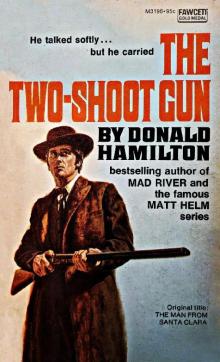 The Two-Shoot Gun
The Two-Shoot Gun Mad River
Mad River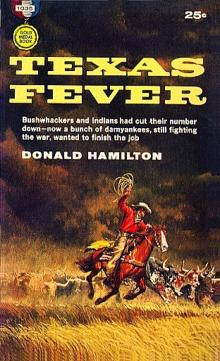 Texas Fever
Texas Fever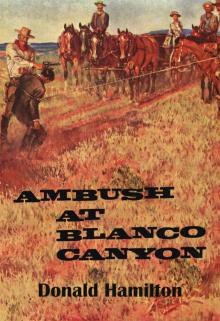 Ambush at Blanco Canyon
Ambush at Blanco Canyon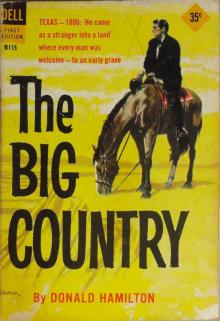 The Big Country
The Big Country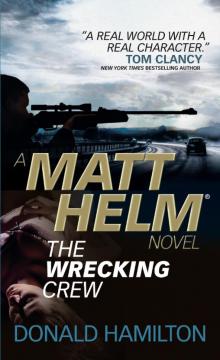 The Wrecking Crew
The Wrecking Crew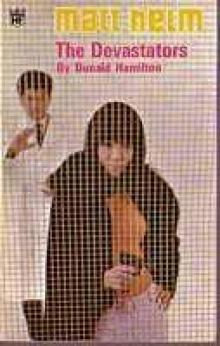 The Devastators mh-9
The Devastators mh-9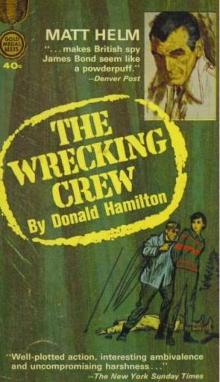 The Wrecking Crew mh-2
The Wrecking Crew mh-2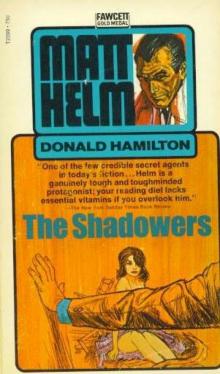 The Shadowers mh-7
The Shadowers mh-7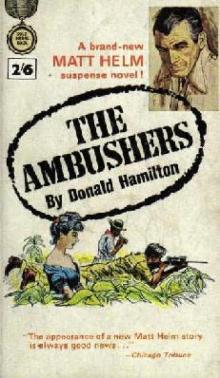 The Ambushers mh-6
The Ambushers mh-6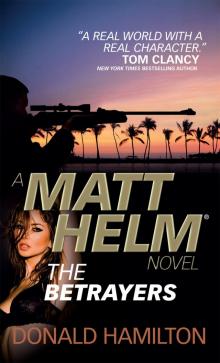 The Betrayers
The Betrayers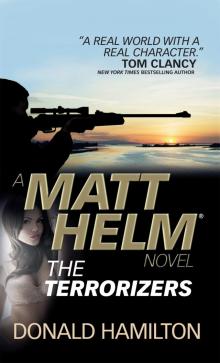 The Terrorizers
The Terrorizers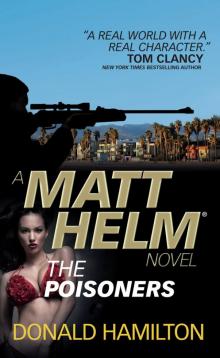 The Poisoners
The Poisoners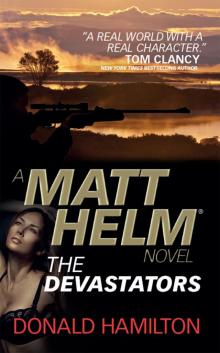 The Devastators
The Devastators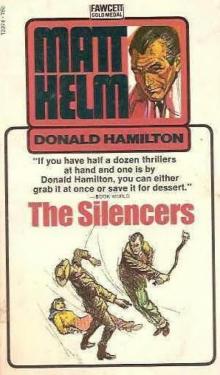 The Silencers mh-5
The Silencers mh-5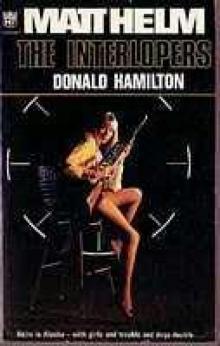 The Interlopers mh-12
The Interlopers mh-12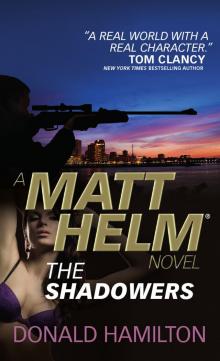 The Shadowers
The Shadowers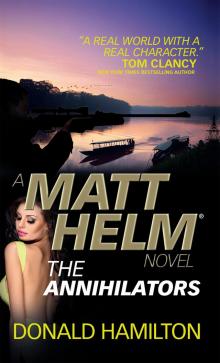 The Annihilators
The Annihilators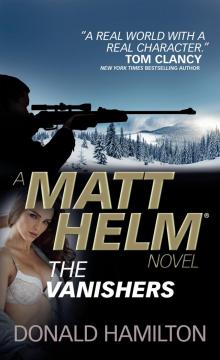 The Vanishers
The Vanishers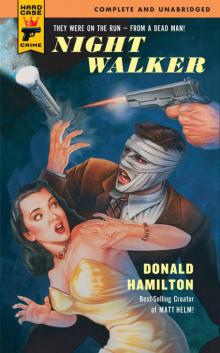 Night Walker
Night Walker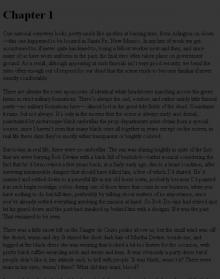 The Revengers
The Revengers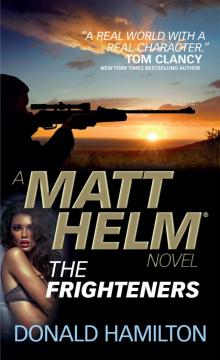 The Frighteners
The Frighteners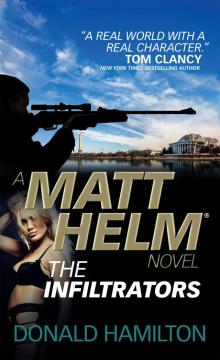 The Infiltrators
The Infiltrators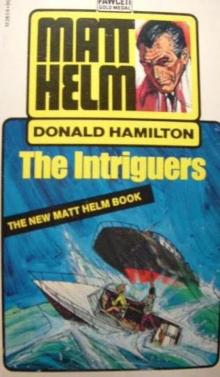 The Intriguers mh-14
The Intriguers mh-14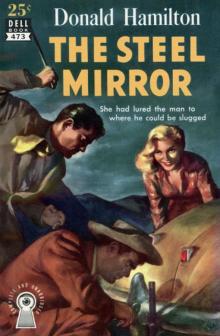 The Steel Mirror
The Steel Mirror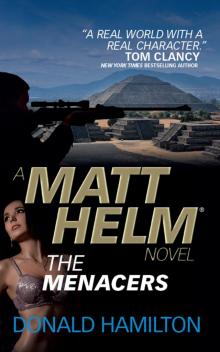 The Menacers
The Menacers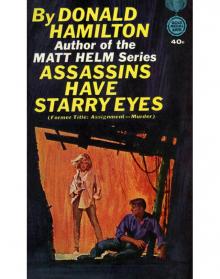 Assassins Have Starry Eyes
Assassins Have Starry Eyes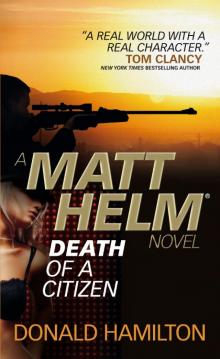 Death of a Citizen
Death of a Citizen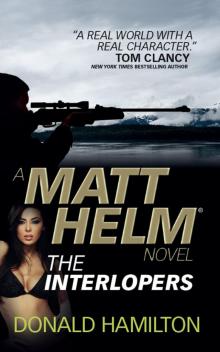 Matt Helm--The Interlopers
Matt Helm--The Interlopers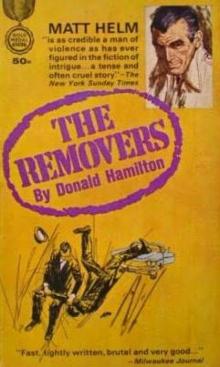 The Removers mh-3
The Removers mh-3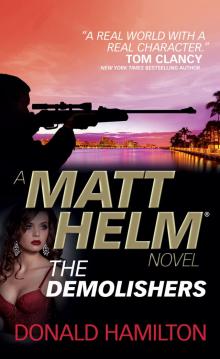 The Demolishers
The Demolishers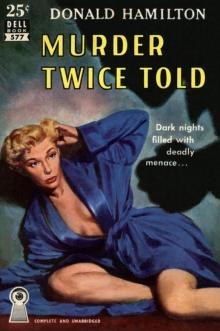 Murder Twice Told
Murder Twice Told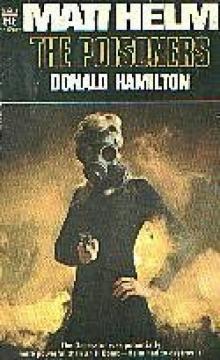 The Poisoners mh-13
The Poisoners mh-13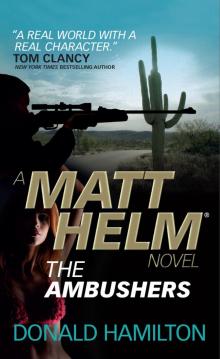 The Ambushers
The Ambushers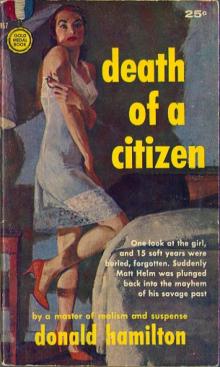 Death of a Citizen mh-1
Death of a Citizen mh-1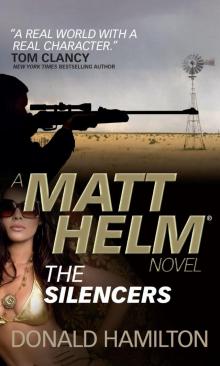 The Silencers
The Silencers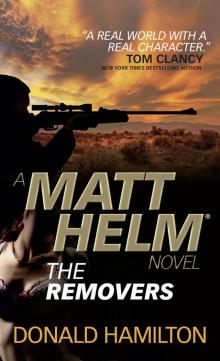 The Removers
The Removers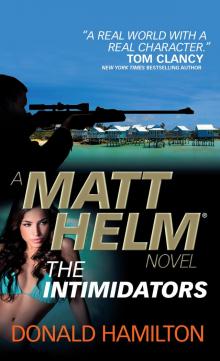 The Intimidators
The Intimidators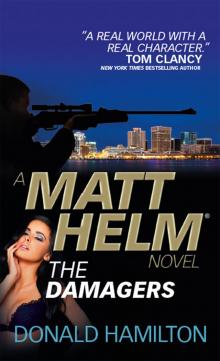 The Damagers
The Damagers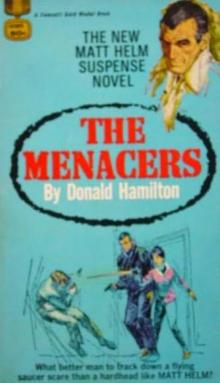 The Menacers mh-11
The Menacers mh-11 The Retaliators
The Retaliators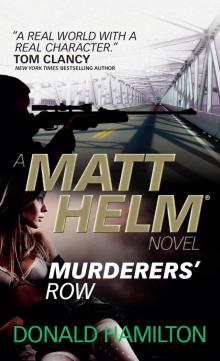 Murderers' Row
Murderers' Row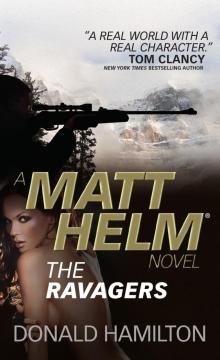 The Ravagers
The Ravagers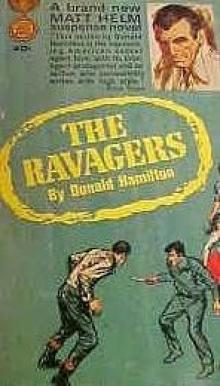 The Ravagers mh-8
The Ravagers mh-8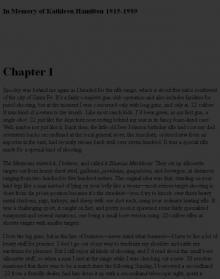 The Threateners
The Threateners The Betrayers mh-10
The Betrayers mh-10